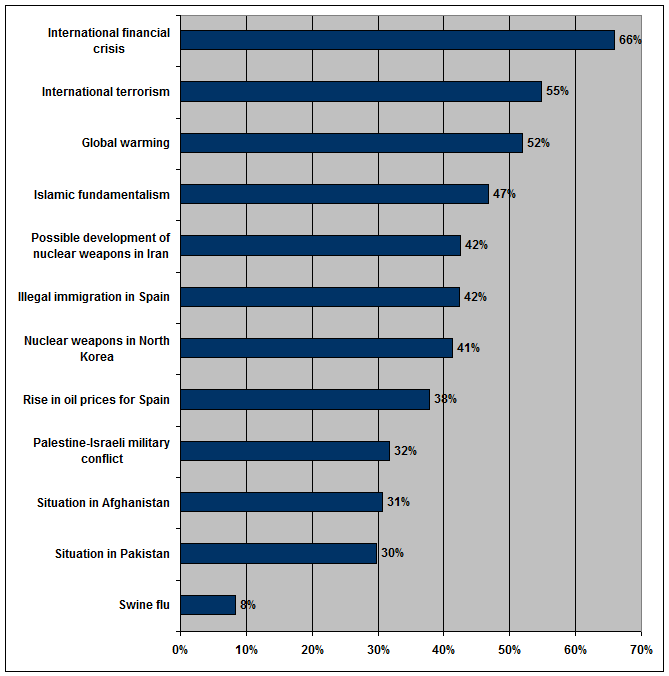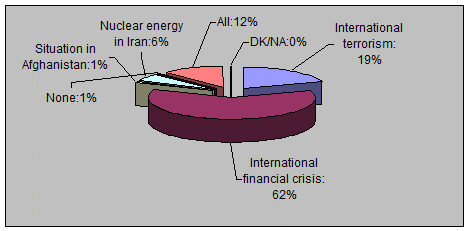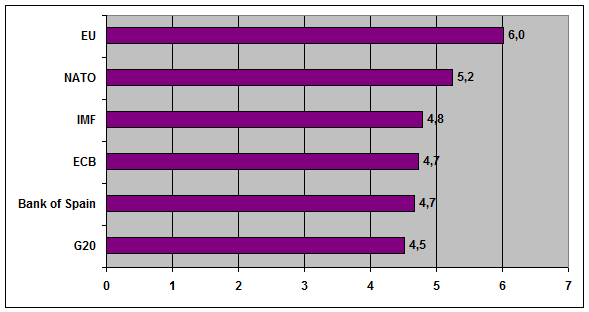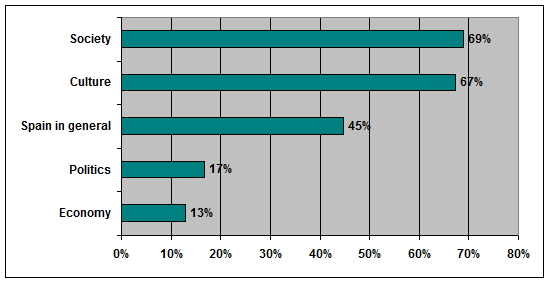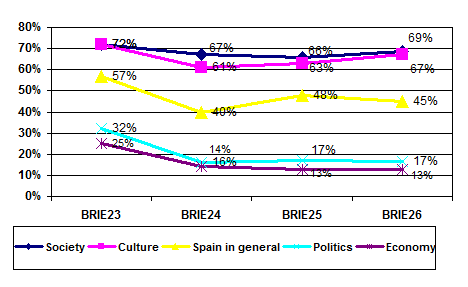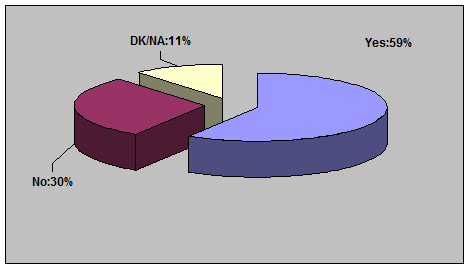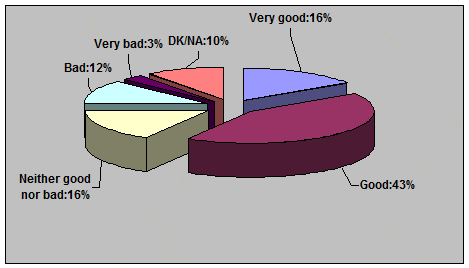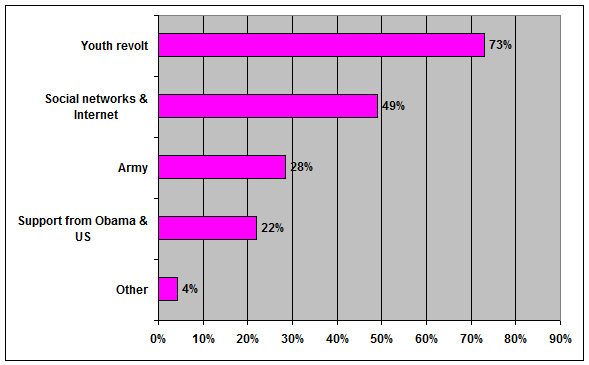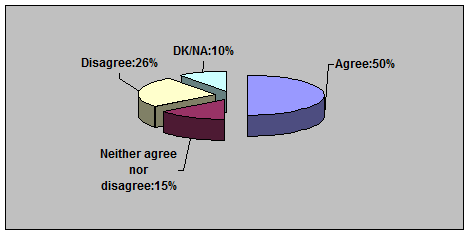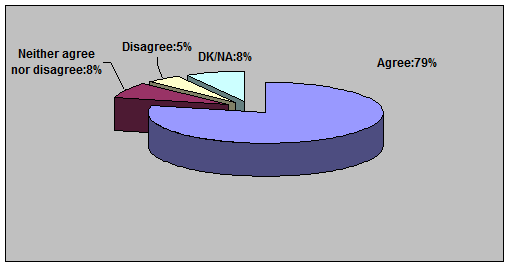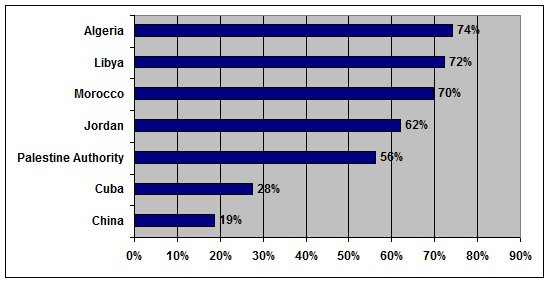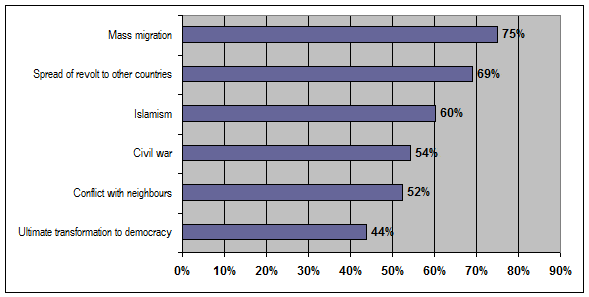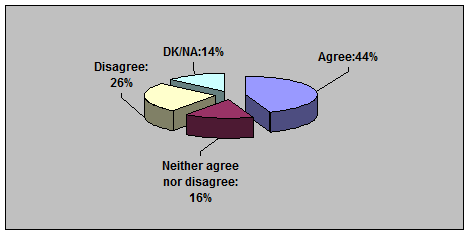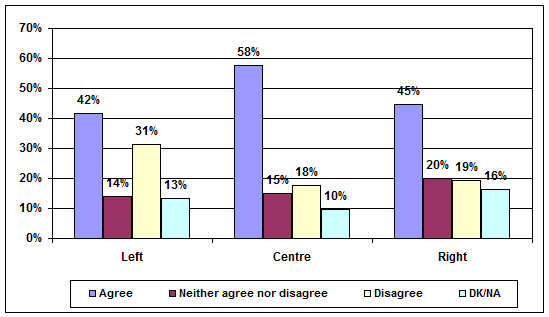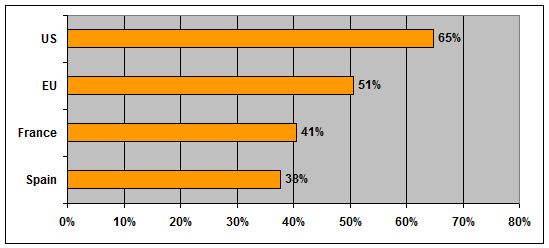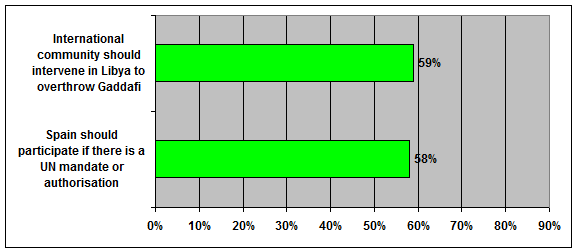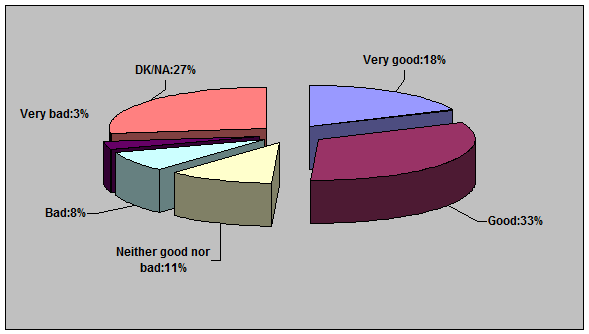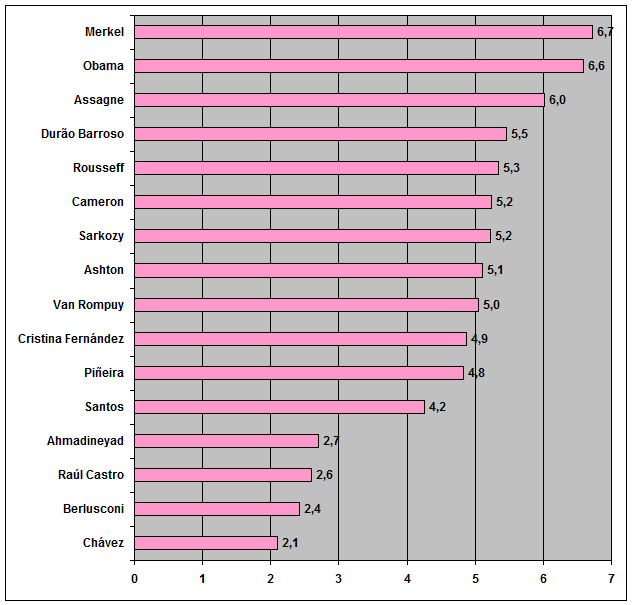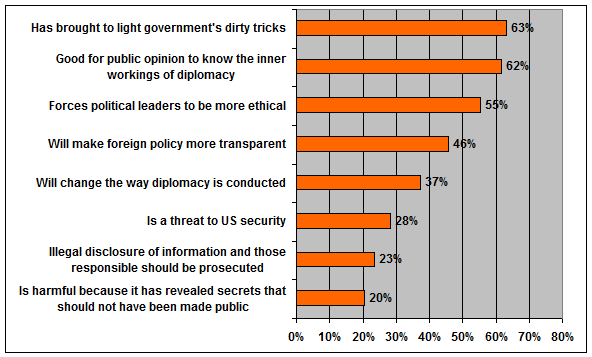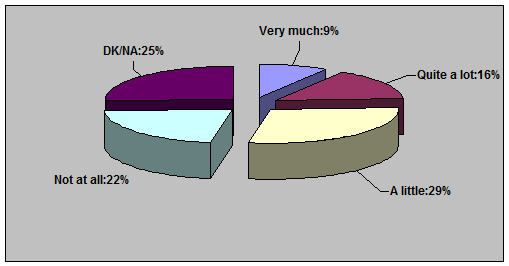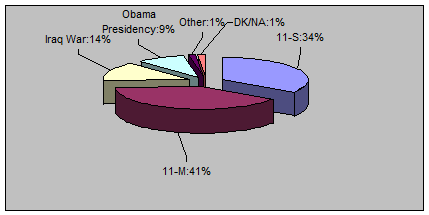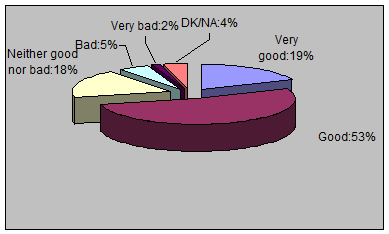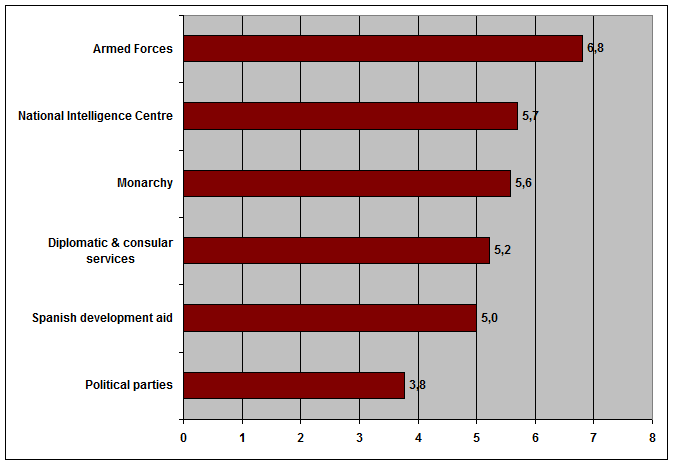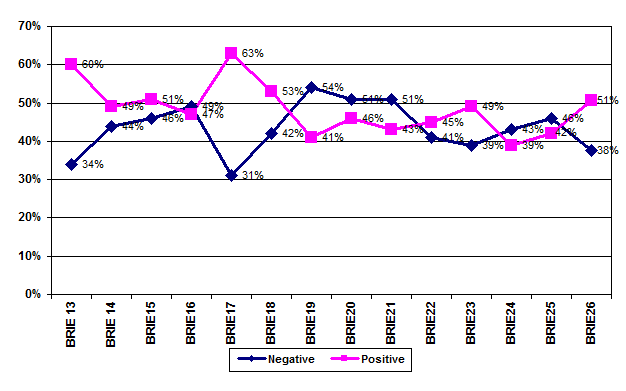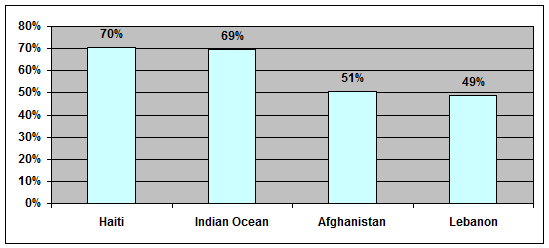TWENTY-SIXTH EDITION OF THE BAROMETER OF THE ELCANO ROYAL INSTITUTE (March 2011)
Press Summary
TECHNICAL DATA
- Universe: general Spanish population, aged 18 and over.
- Sample size: N =1,200 interviewees.
- Interview methodology used: telephone (interviewee called at home).
- Sample size: stratified, directly proportionate to the distribution of the national population, with proportionate quotas according to age and gender.
- Sample error: ±2.9 for global data (1,200n); ±4.0 for subsamples (600n) (*), p = q = 0.5 and a confidence interval of 95.5.
- Survey period: from 15 February to 9 March 2011.
- Field work: Gabinete de Análisis Demoscópico (GAD).
(1) CONCERN OVER THE FINANCIAL CRISIS
- Spaniards continue to perceive the international financial crisis as the greatest threat. Two out of every three (66%) consider it to be ‘extremely serious’. In another area of the economy, 40% of those surveyed assign the maximum level of worry to the rise in oil prices.
Graph 1. Perception of threats, percentage of those who answered ‘extremely serious’
- The crisis continues to be the problem that worries Spaniards most: 62% expressed this view, three times more than for international terrorism.
Of the following four problems, which would you say concerns you the most right now?
Graph 2. Concern for international situation
Despite the effect that austerity measures taken by Europe and Germany have had for Spain, both are among the most highly rated institutions and countries in Spain, with a score of 6 and 6.6, respectively, on a scale of 0 to 10. But the crisis has damaged the image of economic entities, both national and international.
On a scale of 0 to 10, how do you assess the following international organisations?
Graph 3. Average rating of international organisations on a scale of 0 to 10
- The crisis is considered to be damaging for Spain’s image abroad. However, it is important to stress that the problem is limited to the economic field and to a lesser extent to the world of politics. A total of 73% of those polled believe that the image of the Spanish economy abroad is bad, while the percentage of those worried about Spain’s image in other areas such as culture or society does not even reach 20%.
Graph 4. Opinion on Spain’s image abroad in different areas, percentage of people who answered ‘good’ or ‘very good’
- In any case, Spaniards do not think there has been an overall deterioration of their country’s image in recent times.
Graph 5. Evolution of opinion on Spain’s image abroad in different areas, BRIEs 23 to 26
- Although a significant percentage (62%) of Spaniards feel the overseas image of the current Spanish political scene is bad, the retrospective bottom line is still good. A total of 60% also think Spain, because of its transition from the Franco era, is a good model for Arab countries as they move towards democracy.
¿And can Spain serve as a model for those countries, on the basis of its transition from the Franco regime to democracy?
Graph 6. Can Spain be a model?
(2) THE TURMOIL IN THE ARAB WORLD
- Spaniards support change in the Arab world.
How do you assess the pro-democracy reform processes in Tunisia and Egypt?
Graph 7. Assessment of democratic reform in the Arab world
- With regard to the fall of President Hosni Mubarak, Spaniards feel the key factor was student revolts (55%), followed by social media networks and the Internet (20%) and, thirdly, the role of the army (8%).
Graph 8. Main factors in the fall of Mubarak, percentages of ‘very much’ and ‘quite a lot’ answers
- One out of every two Spaniards feels that the democratisation of Arab countries is an irreversible process.
Democratisation of Arab countries is an irreversible process. There is no turning back.
Graph 9. Democratisation is irreversible
- At the same time, there is a certain degree of reasonable uncertainty over the results and consequences.
The changes are just the beginning: there is reason to be cautious.
Graph 10. Caution is justified
- In any case, Spaniards do not think this wave of pro-democracy sentiment will reach dictatorships outside the Muslim world. A total of 70% does not think it will affect China, while 60% think it will not reach Cuba.
Do you think popular revolts like these could happen in the following countries?
Graph 11. Opinion on the probability of revolts spreading to other countries, percentage of ‘high’ and ‘rather high’ answers
- As for the possible consequences of the revolutions in the Arab countries, for 75% of Spaniards the most evident one is massive waves of emigration. And 60% fear Islamic-based leaders will take power.
What do you think might happen as a result of the changes that have taken place so far?
Graph 12. Opinion on probability of various consequences of the uprisings, percentage of ‘high’ and ‘rather high’ answers
- In this regard, 45% of Spaniards polled agree that Islamic parties should be banned from taking part in the new Arab democracies, compared with 26% who think they should take part.
Islamist parties should be banned from taking part in politics in the new democracies.
Graph 13. Islamic parties should be banned
- Opposition to excluding Islamist parties in the new democracies is greater among leftist voters than among those on the centre-right.
Graph 14. Agreement with the idea that ‘Islamist parties should be barred from taking part in new democracies’, according to how interviewees define themselves ideologically
(3) THE SITUATION IN LIBYA
- In general, there is a positive assessment of the international community’s position towards the changes, although there are also many Spaniards who are unable to express an opinion on the West’s position.
Graph 15. Assessment of the role of various countries and international organisations, percentage of ‘positive’ and ‘very positive’ answers
- A total of 59% feel that the international community should intervene in Libya to oust the Gaddafi regime and 58% also back the idea of Spain taking part if there is a UN mandate or authorisation.
- The international community should intervene in Libya to overthrow Gaddafi
- Spain should participate if there is a UN mandate or authorisation
Graph 16. Percentage of interviewees who agree with these statements
(4) WIKILEAKS
- One out of every two Spaniards (51%) expresses a positive view of the diplomatic cables made public by Wikileaks.
What is your opinion of the information coming out of Wikileaks?
Graph 17. Opinion of Wikileaks
- Support is so firm that Wikileaks’ founder Julian Assange is the world’s third most highly rated person, with a score of 6, surpassed only by Angela Merkel (6.7) and Obama (6.6).
Graph 18. Average rating of leaders on a scale of 0 to 10
- Most of those polled feel that Assange has revealed the shady dealings of many governments (63%), that it is good for public opinion to get to know the inner workings of diplomacy (62%), that what he is doing forces political leaders to behave in a more ethical way (55%) and that government foreign policy will become more transparent. (45%).
- That said, 45% think the scandal has been harmful because it disclosed secrets that should not have been made public and 38% feel that a criminal offence of revealing secrets has been committed and those responsible should be prosecuted.
Graph 19. Agreement with various statements on Wikileaks
- In any case, oddly enough the Wikileaks revelations have come as no surprise, which means that diplomacy already had an image that was not good. Half of those polled say it has not changed their way of viewing diplomacy.
To what extent has it changed the way in which you view diplomacy?
Graph 20. Has changed the way of seeing diplomacy
(5) 10 YEARS OF FOREIGN AND DEFENCE POLICY
- Marking the 10th anniversary of the founding of the Elcano Royal Institute, this edition of BRIE features questions on the last 10 years of Spanish foreign policy.
- For Spaniards the most important international political event was the 11 March 2004 terror attack on the Madrid commuter rail network, (40%), followed by the 11 September 2001 attacks in the US (34%). Around 10% also mention the Iraq war and the Obama Presidency.
Which is the most important event to have taken place around the world and in Spanish foreign policy in the last 10 years?
Graph 21. Most important events
- A total of 70% make a positive assessment of the role of the Armed Forces and the Spanish Army in the past 10 years.
How do you assess the role of the Armed Forces over the past 10 years?
Graph 22. Assessment of the Spanish Army’s role
(6) EXCELLENT ASSESSMENT OF THE ARMED FORCES
- Along with the monarchy, the Armed Forces and the Spanish intelligence services are the most highly rated institutions for Spaniards, with a score of 6.8, around double the score given to political parties (3.8).
On a scale of 0 to 10, what score do you assign to…
Graph 23. Average assessment of institutions on a scale of 0 to 10
- Compared to earlier versions of the BRIE, the assessment of the presence of Spanish troops on missions such as Afghanistan has improved.
Graph 24. Evolution of assessment of the presence of Spanish troops in Afghanistan, BRIEs 13 to 26
- Up to 70% of Spaniards believe the Armed Forces are doing a good job in Haiti and the Indian Ocean.
Graph 25. Assessment of Spanish military missions abroad: percentage of ‘positive’ and ‘very positive’ answers


